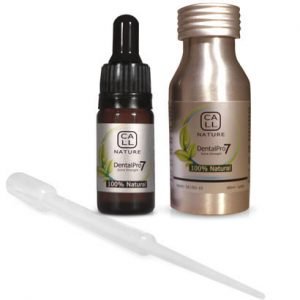The health and wellness of your mouth is an important part of your overall well-being. But with so many different dental products on the market, it can be difficult to determine which one is right for you.
Two popular oral care products are Dental Pro 7 and Therabreath.
In this blog, we will discuss the differences between these two products and help you decide which one is best for you.
What Is Dental Pro 7?
Dental Pro 7 is a natural liquid concentrate that works to eliminate gum disease and bad breath.
It contains powerful natural ingredients such as tea tree oil, peppermint oil, eucalyptus oil, clove oil, spearmint oil, cinnamon bark extract, and more.
- Easy To Use
- Great Results
- Risk-Free Order
- 100% Natural Ingredients
- On The Expensive Side
This product can help reduce inflammation in the gums, fight bacteria that cause bad breath and tooth decay, strengthen enamel, and more.
Additionally, it does not contain any alcohol or harsh chemicals like many other oral care products do.
What Is Therabreath?
Therabreath is a line of oral care products made from natural ingredients such as aloe vera gel, xylitol syrup, grapefruit seed extract, menthol crystals, baking soda powder, green tea powder extract and more.
This product helps to keep your mouth clean and free from bacteria while also providing relief from dryness. It also helps freshen breath by neutralizing odor-causing bacteria in the mouth.
Unlike other oral care products on the market, Therabreath does not contain any artificial colors or flavors or harsh chemicals like alcohol which can be damaging to your teeth and gums over time if used too often.
Ingredients
Both products contain essential oils and xylitol, but they also differ in their ingredients.
The primary difference between these two products is that Dental Pro 7 uses a combination of essential oils while TheraBreath uses only baking soda and xylitol.
Dental Pro 7 contains eucalyptus oil, peppermint oil, wintergreen oil and tea tree oil to help freshen breath. It also contains spearmint essential oil for added minty flavor.
In addition, it has clove bud essential oil which is thought to whiten your teeth naturally by killing bacteria on your teeth surface
Price
Dental Pro 7 is more expensive than Therabreath.
The two systems are similar in many ways, but there are some notable differences. The most obvious difference is price: Dental Pro 7 costs $60 while Therabreath costs around $20.
Which One Works Better?
Both products work well, and they’re both effective at what they do. However, if you want to get the best results possible from your oral care regimen, it’s important to choose the one that’s right for you.
Dental Pro 7 is more potent than Therabreath in terms of its ability to remove plaque and tartar from teeth.
That said, both products have similar levels of effectiveness when compared against each other, they’re just not as potent as Dental Pro 7 when it comes down to removing tartar from your teeth.
In fact, some people who use either product might find themselves experiencing similar levels of effectiveness with either product depending on their own personal preferences or needs!
Conclusion
Both Dental Pro 7 and Therabreath are excellent options for keeping your mouth healthy and fresh-smelling.
- Easy To Use
- Great Results
- Risk-Free Order
- 100% Natural Ingredients
- On The Expensive Side
However, each product has its own unique benefits and drawbacks that may make one better suited to you than another depending on your individual needs.
As you can see, the two options are quite similar. However, there are some differences that you should be aware of when comparing these products.
The main difference between Therabreath and Pro 7 is the price. While Therabreath is more affordable for most people, Pro 7 is slightly more expensive but has a better quality and higher concentration of essential oils in each spray.
Related:


